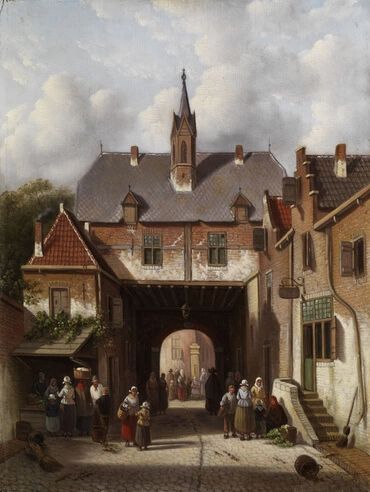Gate

Gates" in ancient times had a significance that does not hold in the modern world. Cities then were enclosed by walls for protection; gates in the walls let people in and out to do their business, but were also the weak points in the cities' defenses. In the Bible, cities on one level represent the minds of individual people. On a broader level, they represent beliefs shared by a community. The gates, then, represent openings where the Lord can feed us an understanding of truth and a desire for good. They also represent points where the hells can invade and sway us with false ideas and evil desires. We are kept in balance during our lifetimes, with influences from both the Lord and from hell. Ideally, we will over our lifetimes continue to invite the Lord farther and farther in and drive the hells back until ultimately the Lord can occupy our minds completely. And that point our belief in Him and His power and love will hold the gates and deny evil any entrance. As individuals, we at that point become angels. As communities, we at that point become part of the Lord's church. And at that point the gates become an entry point, introductory truths that allow people to enter churches and start bringing the Lord into their lives.
Arcana Coelestia # 5165
5165. 'And he restored the chief of the cupbearers to his supervision over [Pharaoh's] drink' means that the sensory impressions belonging to the understanding part were accepted and made subordinate. This is clear from the representation of 'the chief of the cupbearers' as in general the sensory impressions subject to the understanding part, dealt with above; and from the meaning of 'restoring to his supervision over [Pharaoh's] drink' as restoring to order beneath the understanding part. 'Restoring to a position' means restoring to order so as to occupy the lowest position, see 5125; but here a restoration to supervision over the drink is spoken of because that supervision and the kinds of drink that were the objects of it, such as wine, new wine, strong drink, and water, have reference to things of the understanding, as also do giving to drink and actual drinking, 3069, 3168, 3772, 4017. From this it is evident that 'restoring the chief of the cupbearers to his supervision over [Pharaoh's] drink' means a restoration to order of the sensory impressions belonging to the understanding, and thus the acceptance and subordination of them.
[2] Those sensory impressions are accepted and made subordinate when they minister to and serve interior things as the means both to the realization of these in actions and to the acquisition of insights into them. For within the sensory impressions present in his exterior natural a person can see interior things, in much the same way as he sees people's affections within their faces and even more interior affections within their eyes. Without an interior face or mirror such as this no one is able, while living in the body, to engage in any thought at all about things that are above the senses; for what he sees within the sensory impressions may be likened to someone's recognition of other people's affections and thoughts within their faces, without the payment of any attention by him to their actual faces. Or it may be likened to someone listening to another speaking; he pays no attention to the words the speaker uses, only to the meaning of what is uttered by him. The actual words that are used are a mirror in which the inner meaning can be seen. The same is so with the exterior natural; if this did not serve interior things as a mirror in which they see themselves as if in a looking-glass, a person could not engage in any thought at all. This being so, the mirror is formed first - in earliest childhood onwards. But these are matters about which people have no knowledge because what is going on inside a person is not evident unless one stops to reflect on. what takes place inwardly.
[3] The nature of the exterior natural is plainly evident in the next life, for the faces of spirits and of angels are shaped by and in conformity with it. In the light of heaven interior things, especially intentions and ends in view, shine through those faces. If love to the Lord and charity towards the neighbour have formed the interiors, then these cause a brightness to shine in the face, and the face itself is a visual form of love and charity. But if self-love and love of the world, and therefore all kinds of hatred, revenge, cruelty, and the like, have formed the interiors, these cause a devilish appearance to be manifested in the face, and the face itself is a visual form of hatred, revenge, and cruelty. From this one may see what the exterior natural is and the use it serves, also what it is like when made subject to interior things, and what it is like when these are made subject to itself.






